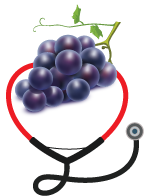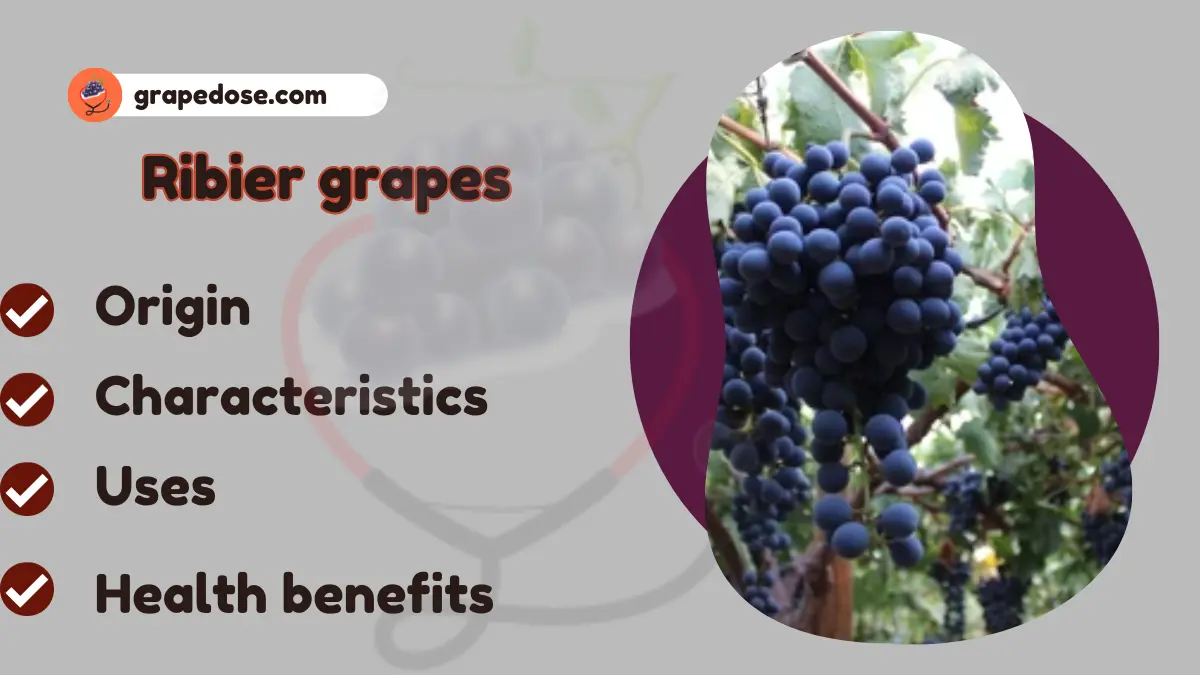Ribier grapes, also known as Alphonse Lavallée grapes. These are a popular variety of table grapes. [1] These grapes are also known for their large size, sweet flavor, and slightly bitter skin. They are a dark blue-black color and have a firm flesh.
Ribier grapes are a good source of antioxidants and fiber. They are also a versatile ingredient that can be eaten fresh, used in salads, or made into jams, jellies, and wine.
In this article we will take a deep look on Ribier grapes.

Origin of Ribier grapes
The first written record of Ribier grapes dates back to the 18th century. They were initially known as “Petit Ribier” or “Petit Rouvier,” but they were later renamed “Alphonse Lavallée” in honor of a French horticulturist who promoted their cultivation.
Ribier grapes were once widely grown in France, but their popularity declined in the 19th century.
Today, they are still grown in some parts of France, but they are more commonly found in other parts of the world, such as California, South Africa, and Australia.
Health Benefits of Ribier grapes

1: Fiber for Digestive Health
Ribier grapes contain a decent amount of fiber, which plays a crucial role in digestive health.
Fiber promotes regular bowel movements, prevents constipation, and helps maintain a healthy gut microbiome.
It also contributes to a feeling of fullness, aiding in weight management.
2: Vitamin C for Immunity
Ribier grapes are a good source of vitamin C, an essential nutrient that strengthens the immune system and helps the body fight off infections.
Vitamin C is also involved in collagen production, promoting healthy skin and wound healing.
3: Potassium for Heart Health
Ribier grapes contain potassium, a mineral that is essential for maintaining healthy blood pressure levels.
Adequate potassium intake helps reduce the risk of hypertension, stroke, and cardiovascular diseases.
4: Manganese for Brain Function
Ribier grapes are a source of manganese, a mineral that plays a vital role in brain function and cognitive health.
Manganese is involved in the production of dopamine, a neurotransmitter that regulates mood, memory, and motor control.
5: Bone Health Support
Ribier grapes contain vitamin K, which is essential for bone health. Vitamin K promotes calcium absorption and bone mineralization, helping to prevent osteoporosis and fractures.
6: Eye Health Protection
The antioxidants in Ribier grapes, particularly anthocyanins, have been shown to protect against age-related macular degeneration, a leading cause of vision loss.
Uses of Ribier grapes
- Ribier grapes are a popular snack or dessert. They are sweet, juicy, and have a slightly bitter skin, which adds a bit of complexity to their flavor.
- Ribier grapes can be added to salads for a touch of sweetness and color. They pair well with salads that include greens, cheese, and nuts.
- Ribier grapes can be made into jams and jellies. The resulting products are sweet and flavorful, and they can be enjoyed on toast, yogurt, or ice cream.
- Ribier grapes can be used to make wine. The resulting wine is typically light-bodied and fruity, with a slightly sweet flavor.
Characteristics of Ribier grapes

- Ribier grapes are large, round, and have a dark blue-black skin with a slightly pruinose (dusty) appearance.
- Ribier grapes are known for their sweet flavor with a slightly bitter skin, which adds complexity to their taste.
- Ribier grapes have a firm, crisp flesh that makes them enjoyable to eat fresh.
- Ribier grapes are typically larger than other grape varieties, with berries ranging from 18 to 22 millimeters in diameter.
- Ribier grapes are typically harvested in late August or early September.
- Ribier grapes can be stored for up to 2 months under refrigerated conditions.
Ribier Grapes are not just a snack; they are a journey into a world of unique flavors and culinary possibilities.
Whether you enjoy them fresh, in a salad, or in a glass of wine, Ribier Grapes are sure to leave a lasting impression on your taste buds. Embrace the delightful world of Ribier Grapes and elevate your culinary experiences.
Get ready to embark on a flavorful adventure, it’s time to savor the extraordinary taste of Ribier Grapes!

